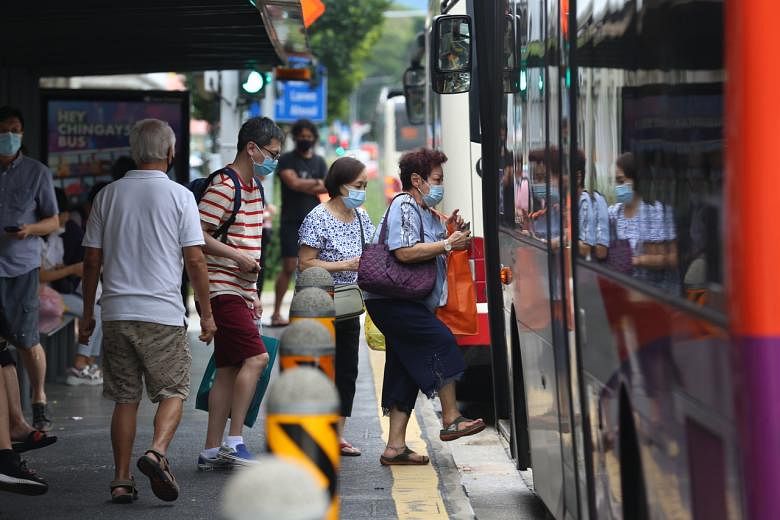- Joined
- Jul 25, 2008
- Messages
- 13,777
- Points
- 113
On the one hand, the PAP said must have calibrated opening to prevent more deaths of unvaccinated seniors. On the other hand, they have already planned to relax dining restrictions ahead of Nov 16 to pander to the foreigners. Do you actually think the PAP is relaxing the dining rules for Sinkies?

The forum will be held from Nov 16 to 19 and is expected to draw more than 300 participants from 51 countries.ST PHOTO: KUA CHEE SIONG

Goh Yan Han
Oct 23, 2021
SINGAPORE - Delegates at the Bloomberg New Economy Forum (NEF) in November will be allowed to dine in groups of up to five at designated restaurants, subject to stringent criteria, the authorities confirmed on Sunday (Oct 24).
On arrival in Singapore, they will be exempted from quarantine if the result of the polymerase chain reaction (PCR) Covid-19 test they take is negative.
In response to queries from The Straits Times, the Singapore Tourism Board (STB) and Economic Development Board (EDB) said all foreign delegates must be fully vaccinated, and undergo daily pre-event testing on conference days.
The forum will be held from Nov 16 to 19 and is expected to draw more than 300 participants from 51 countries, including current and former heads of states and global chief executive officers.
The event marks another step forward for Singapore's hospitality and travel industry amid the nation's pivot to an endemic Covid-19 scenario.
The Republic's latest pandemic restrictions state that dining-in will be limited to a maximum of two people till Nov 21, though the curbs will be reviewed before then.
In a note from EDB chairman Beh Swan Gin to forum delegates that was seen by ST, he said groups of up to five may dine together at NEF venues and other restaurants in the city.
Guests can include those who are not NEF delegates, he added.
STB and EDB said the venues and restaurants are pre-designated and made exclusive for the event to provide safe business networking spaces.
Non-delegates who attend meals or meetings at these locations must undergo a pre-event test and obtain a negative result.
"It is with these added requirements that business meals for up to five fully vaccinated persons will be allowed for Bloomberg NEF participants," said the agencies.
Outside of these pre-designated venues and restaurants, the prevailing safe management measures in Singapore will apply to the delegates, including the two-person rule for meals.
Dr Beh's note said NEF delegates who apply for an authorised letter of entry can enter Singapore from any country regardless of travel history, and arrive on any commercial flight or private jet.
The delegates are free to attend meetings and company visits outside the NEF.
The forum is one of the events under the Mice event pilot by STB that aims to allow business conferences and exhibitions to gradually restart and support Singapore's hospitality and travel industry.
Mice stands for meetings, incentives, conferences and exhibitions. Recent events held include Gamescom Asia and the Joint Leadership Summit of the top Mice associations.
Under this pilot, all foreign delegates, including those at the Bloomberg NEF, have to apply for a letter of entry to visit Singapore and be fully inoculated with vaccines under the World Health Organisation's emergency use listing.
They have to take the PCR swab test upon arrival and undergo daily pre-event testing on event days.
Local delegates have to undergo the daily pre-event testing, said STB and EDB.
They added: "As we learn from the experience of these pilot events, we will adjust the health and safety protocols so that larger Mice events can resume in due course in a safe, trusted and innovative manner."
- All delegates must be fully vaccinated with a vaccine under WHO's emergency use listing.
- They must undergo a PCR swab test on arrival and stay in their hotel room until it is confirmed to be negative.
- They have to undergo daily pre-event testing on event days.
- Pre-event testing is also required for non-delegates attending meals and meetings in venues and restaurants that have been pre-designated to allow delegates to dine in groups of up to five.
Delegates at Bloomberg forum in S'pore can dine in groups of 5 at specific venues

The forum will be held from Nov 16 to 19 and is expected to draw more than 300 participants from 51 countries.ST PHOTO: KUA CHEE SIONG

Goh Yan Han
Oct 23, 2021
SINGAPORE - Delegates at the Bloomberg New Economy Forum (NEF) in November will be allowed to dine in groups of up to five at designated restaurants, subject to stringent criteria, the authorities confirmed on Sunday (Oct 24).
On arrival in Singapore, they will be exempted from quarantine if the result of the polymerase chain reaction (PCR) Covid-19 test they take is negative.
In response to queries from The Straits Times, the Singapore Tourism Board (STB) and Economic Development Board (EDB) said all foreign delegates must be fully vaccinated, and undergo daily pre-event testing on conference days.
The forum will be held from Nov 16 to 19 and is expected to draw more than 300 participants from 51 countries, including current and former heads of states and global chief executive officers.
The event marks another step forward for Singapore's hospitality and travel industry amid the nation's pivot to an endemic Covid-19 scenario.
The Republic's latest pandemic restrictions state that dining-in will be limited to a maximum of two people till Nov 21, though the curbs will be reviewed before then.
In a note from EDB chairman Beh Swan Gin to forum delegates that was seen by ST, he said groups of up to five may dine together at NEF venues and other restaurants in the city.
Guests can include those who are not NEF delegates, he added.
STB and EDB said the venues and restaurants are pre-designated and made exclusive for the event to provide safe business networking spaces.
Non-delegates who attend meals or meetings at these locations must undergo a pre-event test and obtain a negative result.
"It is with these added requirements that business meals for up to five fully vaccinated persons will be allowed for Bloomberg NEF participants," said the agencies.
Outside of these pre-designated venues and restaurants, the prevailing safe management measures in Singapore will apply to the delegates, including the two-person rule for meals.
Dr Beh's note said NEF delegates who apply for an authorised letter of entry can enter Singapore from any country regardless of travel history, and arrive on any commercial flight or private jet.
The delegates are free to attend meetings and company visits outside the NEF.
The forum is one of the events under the Mice event pilot by STB that aims to allow business conferences and exhibitions to gradually restart and support Singapore's hospitality and travel industry.
Mice stands for meetings, incentives, conferences and exhibitions. Recent events held include Gamescom Asia and the Joint Leadership Summit of the top Mice associations.
Under this pilot, all foreign delegates, including those at the Bloomberg NEF, have to apply for a letter of entry to visit Singapore and be fully inoculated with vaccines under the World Health Organisation's emergency use listing.
They have to take the PCR swab test upon arrival and undergo daily pre-event testing on event days.
Local delegates have to undergo the daily pre-event testing, said STB and EDB.
They added: "As we learn from the experience of these pilot events, we will adjust the health and safety protocols so that larger Mice events can resume in due course in a safe, trusted and innovative manner."
Safeguards for Bloomberg NEF
EDB and STB said that for the Bloomberg New Economy Forum to be a success, safety is the top priority. Among the safeguards that will be in place are:- All delegates must be fully vaccinated with a vaccine under WHO's emergency use listing.
- They must undergo a PCR swab test on arrival and stay in their hotel room until it is confirmed to be negative.
- They have to undergo daily pre-event testing on event days.
- Pre-event testing is also required for non-delegates attending meals and meetings in venues and restaurants that have been pre-designated to allow delegates to dine in groups of up to five.


